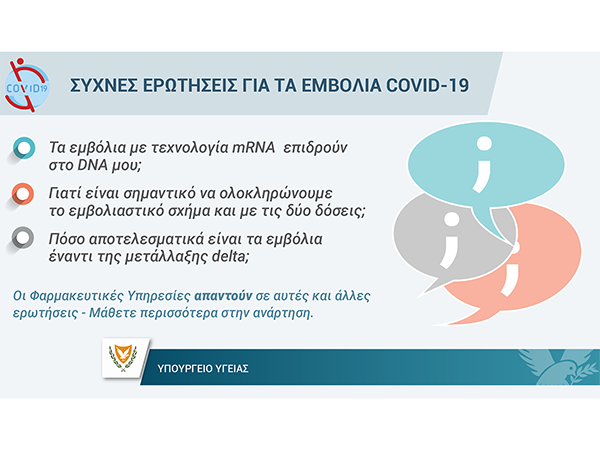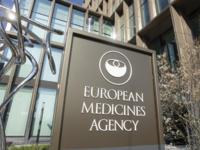Press Releases

13-07-2021 11:51
Answers to frequently asked questions about the vaccines against COVID-19 by the Pharmaceutical Services of the Ministry of Health
1. Why should young individuals get vaccinated?
Although the individual risk of serious SARS-CoV-2 illness in young individuals appears to be lower in relation to the rest of the population, young individuals are not immune to the virus. They can get infected, get ill and transmit the virus. As long as young individuals remain unvaccinated, there is an increasing risk of transmitting the virus to older people or to people belonging to vulnerable groups - who did not or cannot be vaccinated for some reason - and who are more likely to develop serious illness and need hospitalization.
With the vaccination of young individuals, the immunization of a percentage of the population is achieved, which allows the immunization of an even greater percentage required, to achieve the so called herd collective immunity. Namely, the level of vaccinated individuals, above which the virus will no longer find many individuals to infect, which will prevent it from reproducing and spreading.
Therefore, the immunization of young individuals through vaccination helps in stopping the epidemic.
2. Why is it important to complete the vaccination scheme with both doses of the vaccine?
If one receives a two-dose vaccine (Vaxzevria (AstraZeneca), Comirnaty (Pfizer/Biontech), SpikeVax (Moderna)), he/she should complete the full vaccination scheme with both doses in order to have a stronger protection against the COVID-19 virus.
Preliminary efficacy data from the United Kingdom have shown that two doses of the Vaxzevria and Comirnaty vaccines protect against illness caused by the delta mutation. In contrast, the administration of only one dose appears to provide reduced protection. In a population that has received only one dose of the vaccine, there is a potential risk of mutations of the virus to surface. The neutralization antibody levels that are induced by the first dose of mRNA vaccines are low, which draws attention to the possibility of reduced protection. The longer the 2nd dose is delayed, the more likely it is for new mutations of SARS-CoV-2 to surface which the vaccines do not cover.
Therefore, the completion of the vaccination scheme with both doses is very important, so as to achieve strengthening of the immune response and protection against new mutations.
3. Can a different vaccine be used as a 2nd dose than the one received as a 1st dose?
It is known that vaccination campaigns in some EU member states implement the strategy of administering a 2nd dose with a different COVID-19 vaccine than that used for the 1st dose. For example, some EU citizens may receive a 1st dose of Vaxzevria and a 2nd dose of Comirnaty.
This vaccination strategy (sometimes referred to as “mix and match”), in which a different vaccine is administered for the 2nd dose in a recommended two-dose schedule, has been, historically, applied to some other vaccines.
For the time being, the Pharmaceutical Services are not in a position to make definite recommendations regarding the administration of different vaccines against COVID-19 for the two doses. However, preliminary results from studies in Spain and Germany suggest a satisfactory immune response and no safety concerns. More data are expected soon, including those from the COM-COV and COM-COV-2 studies, which are investigating a number of vaccination schemes in which different vaccines are administered for the 1st and 2nd dose. The Pharmaceutical Services will continue to review the data as they become available.
4. What do we know so far about the possible need for a 3rd dose of the vaccines (or a 2nd dose for the Janssen vaccine)?
Based on the data available so far, we do not know the duration of protection provided by the vaccines against the SARS-CoV-2 virus and whether a 3rd dose (or 2nd dose for Janssen) will be needed. The duration of protection provided by the vaccine is expected to be longer than natural immunity, which is acquired after natural infection (after infection of the individual by the virus).
With the granting of a distribution authorization of a vaccine, we only have information on the duration of immunity for as long as the duration of the clinical trials last. But while the manufacturer continues to monitor the vaccinated individuals for several months or more, we will have a better picture of the duration of immunity over time. In addition, by vaccinating more people we will soon have more data to be able to answer this question. The continuous monitoring of the vaccines’ efficacy is essential as various factors, such as the ability of the virus to mutate and the geographical area can affect efficacy.
Therefore, we will be able to better understand over time if vaccines against COVID-19 require a booster dose or annual administration as is the case with the flu vaccine.
5. Can the vaccines against COVID-19 be administered to children?
Even though fewer children have been infected with COVID-19 by contrast to adults, children can become infected with the SARS-CoV2 virus, get sick and spread the virus to other people.
At this stage, the only vaccine against COVID-19, which has been licensed by the European Medicines Agency to be administered to individuals aged 12 and over is Comirnaty (Pfizer/BioNTech).
The clinical trial with the Comirnaty vaccine (Pfizer/BioNTech) on children aged 12-15 has shown that this vaccine is highly effective in preventing COVID-19. The most common side effects in the 12-15 age group are similar to those observed in individuals over the age of 16 and include pain at the spot of injection, fatigue, headache, muscle aches and pain in the joints, chills and fever. These side effects are usually mild to moderate in severity and improve within a few days after vaccination.
6. Is vaccination with a vaccine that is not licensed by the European Medicines Agency (EMA) safe?
The European Medicines Agency cannot make recommendations for vaccines that have not been evaluated for use in the European Union, as vaccines that are approved and administered outside the European Union are evaluated by different regulatory procedures than those of the European Medicines Agency.
Following the request for a distribution authorization for a vaccine in the EU, EMA conducts its own independent scientific assessment of the request to ensure the safety, efficacy and quality of the vaccine and the protection of the citizens’ trust.
7. DomRNAvaccinesaffectmyDNA?
No. Messenger RNA (mRNA) is not the same as DNA and cannot be combined with our DNA to alter our genetic code. The mRNA that is contained in the vaccine does not enter the cell nucleus where our DNA is located. It temporarily instructs our cell to produce a specific protein of the virus, against which our immune system then reacts and is eventually trained to react to the virus.
8. How effective are COVID-19 vaccines against the delta mutation (Indian mutation)?
According to the ECDC (European Centre for Disease Prevention and Control), based on the scientific data available so far, the delta mutation is 40-60% more transmittable than other mutations that are present in the community and is associated with a higher risk of hospitalization. It is also estimated that by the end of August 2021, it will represent 90% of all SARS-CoV-2 viruses circulating in the European Union.
Preliminary scientific evidence suggests that the delta mutation may infect individuals who have received only one of the two doses of all available vaccines. However, according to new efficacy data, receiving two doses of the currently available vaccines provides high protection against hospitalization after infection with the delta mutation (Indian mutation) and its effects. According to the latest information from WHO (World Health Organization), scientific studies have shown the effectiveness of the Pfizer-BioNTech (Comirnaty) and AstraZeneca (Vaxzevria) vaccines against the Delta mutation (88% for Pfizer/BioNTech-Comirnaty and 67% for AstraZeneca-Vaxzevria).
9. Are vaccines against coronavirus SARS-CoV-2 safe or do they have unwanted side effects? Ifso, whichones?
The vaccines against coronavirus SARS-CoV-2 are safe and, based on the latest safety data, the benefits outweigh the risks. Prior to any approval, vaccines are subjected to rigorous testing and clinical trials to ensure that they meet the internationally agreed safety and efficacy reference standards. The competent regulatory Authorities are constantly monitoring the use of COVID-19 vaccines to ensure that they remain safe.
Like all vaccines, COVID-19 vaccines can cause side effects, although not to everyone. The side effects reported for vaccines against COVID-19 are mostly mild to moderate and with a short duration. The most common include redness and pain at the spot of injection, fever, fatigue, headache, muscle aches, chills, nausea, diarrhea and swelling. In some cases they may be more severe or last longer. The chances of any of the above side effects occurring after vaccination vary depending on the particular COVID-19 vaccine. Further information can be found in the Instructions for Use Leaflet: User Information, which is available for each vaccine on the European Medicines Agency website.
10. Why are SputnikV and Novavax vaccines not available in Cyprus?
The vaccines against COVID-19 can be approved and used provided that they comply with all the quality, safety and efficacy requirements as set out in the EU pharmaceutical legislation and, after ensuring, through the scientific evaluation of the submitted request for distribution authorization, that their benefits outweigh their risks.
The available vaccines in Cyprus are those that have been evaluated and licensed by the European Medicines Agency. For the time being, the Sputnik V and Novavax vaccines have not been authorized by EMA in the EU member states but are in the process of being reviewed. This means that EMA evaluates the data that are obtained through clinical trials as soon as they become available. This process will continue until sufficient information is available for the submission of a formal distribution authorization request to EMA.
* The answers to the above questions are based on the data available so far and the current recommendations of European and world organizations on public health issues and which are constantly updated.
Sources: www.cdc.gov/coronavirus, www.who.int, www.ec.europa.eu, www.ema.europa.eu
(MPO/NG)
Relevant Press Releases





08-01-2024 11:39
Curriculum vitae of the new Minister of Health, Mr Michael Damianos


